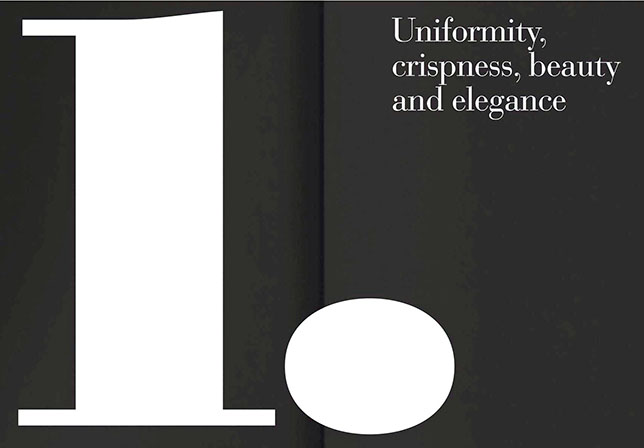Giambattista Bodoni (1740-1813) was an Italian typographer, type-designer, compositor, printer and publisher in Parma, Italy.
Giambattista Bodoni was the fourth son of a master printer. He was made director of the Royal Printing House of the Duke of Parma. No printer was more acclaimed in his own lifetime than Giambattista Bodoni. He did away with old-style letters and introduced a new clear simple type - the Modern typeface. The roman letter he cut in 1798 is usually what we mean by a Bodoni.
His type was characterised by a severe simplicity. In his influential Manuale Tipografico of 1818, he laid down the four principles of type design "from which all beauty would seem to proceed", which were: regularity, cleanness, good taste, and charm.
He first took the type-designs of Pierre Simon Fournier as his exemplars, but afterwards became an admirer of the more modelled types of John Baskerville; and he and Firmin Didot evolved a style of type called 'New Face', in which the letters are cut in such a way as to produce a strong contrast between the thick and thin parts of their body. Bodoni designed many type-faces, each one in a large range of type sizes. He is even more admired as a compositor than as a type-designer, as the large range of sizes which he cut enabled him to compose his pages with the greatest possible subtlety of spacing. Like Baskerville, he sets off his texts with wide margins and uses little or no illustrations or decorations.
In advertising Bodoni has been used in many logos because of its classic style including Guerlain, Elizabeth Arden, Giorgio Armani and the classic “CK” for Calvin Klein. In magazine publications such icons as Harper’s Bazzar and the classic architecture magazine Metropolis both use Bodoni as their basic text font. In addition Elle magazine ahs used it for logo and titles.
Variations on the Bodoni font have appeared in many places in the entertainment media including the cover slip for the single Britney Spears 3 was Bodoni Stn-Poster Italic as well as the show logo for The News Hour with Jim Lehr which is in Bodoni TS-Demi Bold.
Giambattista Bodoni was the fourth son of a master printer. He was made director of the Royal Printing House of the Duke of Parma. No printer was more acclaimed in his own lifetime than Giambattista Bodoni. He did away with old-style letters and introduced a new clear simple type - the Modern typeface. The roman letter he cut in 1798 is usually what we mean by a Bodoni.
His type was characterised by a severe simplicity. In his influential Manuale Tipografico of 1818, he laid down the four principles of type design "from which all beauty would seem to proceed", which were: regularity, cleanness, good taste, and charm.
He first took the type-designs of Pierre Simon Fournier as his exemplars, but afterwards became an admirer of the more modelled types of John Baskerville; and he and Firmin Didot evolved a style of type called 'New Face', in which the letters are cut in such a way as to produce a strong contrast between the thick and thin parts of their body. Bodoni designed many type-faces, each one in a large range of type sizes. He is even more admired as a compositor than as a type-designer, as the large range of sizes which he cut enabled him to compose his pages with the greatest possible subtlety of spacing. Like Baskerville, he sets off his texts with wide margins and uses little or no illustrations or decorations.
In advertising Bodoni has been used in many logos because of its classic style including Guerlain, Elizabeth Arden, Giorgio Armani and the classic “CK” for Calvin Klein. In magazine publications such icons as Harper’s Bazzar and the classic architecture magazine Metropolis both use Bodoni as their basic text font. In addition Elle magazine ahs used it for logo and titles.
Variations on the Bodoni font have appeared in many places in the entertainment media including the cover slip for the single Britney Spears 3 was Bodoni Stn-Poster Italic as well as the show logo for The News Hour with Jim Lehr which is in Bodoni TS-Demi Bold.
 |
| Giambattista Bodoni, 1740-1813 |




























































Maravilloso, me encanto el análisis
ReplyDelete